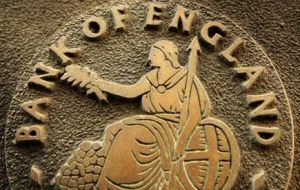MercoPress. South Atlantic News Agency
Bank of England leaves further stimuli and rate on hold
 On Friday the bank should release stats showing lending rates to consumers and small businesses are lower
On Friday the bank should release stats showing lending rates to consumers and small businesses are lower The Bank of England has decided not to extend its quantitative easing (QE) stimulus program, which has injected £375bn into the UK financial system. Under QE, the Bank creates money and uses it to buy government bonds to try to stimulate the economy.
The Bank's Monetary Policy Committee (MPC) also decided on Thursday to keep interest rates at 0.5%, the record low they have been held at since March 2009.
The UK came out of recession recently, growing 1% between July and September, mostly attributed to the activity generated by the London Olympic Games. But a succession of poor economic indicators and corporate results has led many observers to believe that the economy is still weak, leading to speculation that more QE would be needed.
Indeed, the minutes from the last MPC meeting in October showed that some members thought more QE would be required at some point in the future.
“We are pretty sure that the economy will need more stimuli in the months ahead,” said Vicky Redwood of Capital Economics.
“And we do not think that the committee is out of firepower yet.” Wednesday, the European Commission cut its 2013 Euro zone growth forecast from 1% to just 0.1% and said it expected unemployment to continue rising next year.
As about half of Britain's trade is with Europe, the commission's forecast, if accurate, could have a significant knock-on effect for the UK. But the jury is out on whether QE is effective enough at stimulating consumer spending and business investment.
In July, the Bank launched its Funding for Lending Scheme (FLS), aimed at encouraging banks and building societies to increase the size and frequency of loans they make to consumers and small businesses.
Under FLS, the Bank lends money to the financial institutions at below market rates, and offers a better deal to those who make the most loans. As yet there is no published data showing how well the scheme is going.
However, on Friday the Bank of England is due to release statistics showing the lending rates being offered by financial institutions, and a general lowering of rates could indicate that FLS is beginning to work.
The Thursday brief release said: The Bank of England’s Monetary Policy Committee today voted to maintain the official Bank Rate paid on commercial bank reserves at 0.5%. The Committee also voted to maintain the stock of asset purchases financed by the issuance of central bank reserves at £375 billion.
The Committee’s latest inflation and output projections will appear in the Inflation Report to be published at 10.30am on Wednesday 14 November. The minutes of the meeting will be published at 9.30am on Wednesday 21 November.




Top Comments
Disclaimer & comment rules-

-

-

Read all commentsThat sounds like someone is filling their pockets...
Nov 09th, 2012 - 06:35 am 0@1
Nov 09th, 2012 - 09:59 am 0Really, I'm surprised you can hear anything over those pots and pans, can you hear them in Uruguay? It sounds to me like a country that chose not to get saddled to Euro and is able to stimulate its economy independently. Look at Ireland for gods sake, they can't even fart without prior approval from Brussels. Anyway, when we achieve the international insignificance of Uruguay, let me know :-)
We need a stimulus, and doing nothing or cutting will only make things worse, but our version of QE was indeed filling someones pockets, the someone in question being the same banks who got us into this mess. We gave the money to them to restore their confidence so they could invest, and guess what, they just took it and hoarded it - no-one saw that one coming eh!
Nov 09th, 2012 - 10:20 am 0Commenting for this story is now closed.
If you have a Facebook account, become a fan and comment on our Facebook Page!